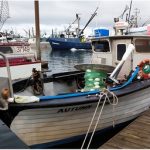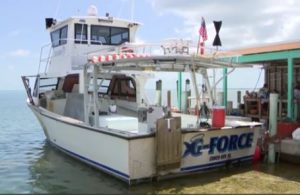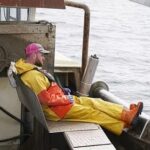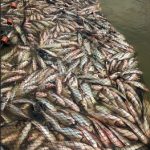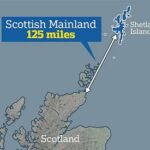Tag Archives: Ecology Action Centre
N.S. swordfish harpoon fleet urged to bring tourists aboard to boost troubled sector
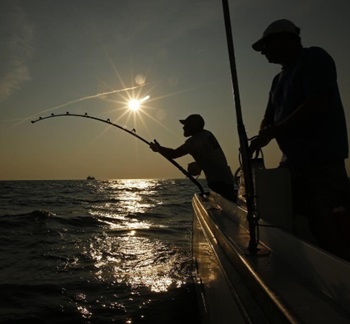 An environmental group says Nova Scotia’s commercial swordfish fleet could generate millions in added revenue by bringing tourists along for fishing trips and using different gear. The Ecology Action Centre says swordfish harpooning — lunging a long spear into the water to catch a fish — has become increasingly difficult and less economically viable because swordfish are appearing less often at the surface due to changing water conditions. In a report released Wednesday, the centre says changing ocean conditions are preventing fishers who use the traditional fishing method from fulfilling their already small swordfish quotas. The group’s solution is for the harpoon fleet to start using a single deepwater hook and line — called rod and reel gear — and to charge tourists to come aboard for a “once-in-a-lifetime experience.” more, >>CLICK TO READ<< 18:49
An environmental group says Nova Scotia’s commercial swordfish fleet could generate millions in added revenue by bringing tourists along for fishing trips and using different gear. The Ecology Action Centre says swordfish harpooning — lunging a long spear into the water to catch a fish — has become increasingly difficult and less economically viable because swordfish are appearing less often at the surface due to changing water conditions. In a report released Wednesday, the centre says changing ocean conditions are preventing fishers who use the traditional fishing method from fulfilling their already small swordfish quotas. The group’s solution is for the harpoon fleet to start using a single deepwater hook and line — called rod and reel gear — and to charge tourists to come aboard for a “once-in-a-lifetime experience.” more, >>CLICK TO READ<< 18:49
Herring quota in southwestern Nova Scotia, Bay of Fundy, reduced again
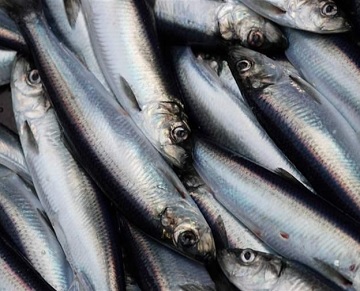 The Department of Fisheries and Oceans has again lowered the Atlantic herring quota in southwestern Nova Scotia and the Bay of Fundy, this time for 2024 to 2027. DFO has announced the total allowable catch for the fishery will be 16,000 tonnes per season over those four seasons. The 2023 allocation was 21,000 tonnes. “Atlantic herring, like many fisheries, faces challenges as a result of climate change, which has led to herring that are smaller in size and that have more difficulty surviving and reproducing in their ecosystem,” says a news release from the department. “We recognize the economic impacts this decision will have on the families and communities that rely on income from fishing and processing herring. But such a decision is necessary to ensure recovery and protect the resource for future generations,” said the DFO release. more, >>CLICK TO READ<< 16:40
The Department of Fisheries and Oceans has again lowered the Atlantic herring quota in southwestern Nova Scotia and the Bay of Fundy, this time for 2024 to 2027. DFO has announced the total allowable catch for the fishery will be 16,000 tonnes per season over those four seasons. The 2023 allocation was 21,000 tonnes. “Atlantic herring, like many fisheries, faces challenges as a result of climate change, which has led to herring that are smaller in size and that have more difficulty surviving and reproducing in their ecosystem,” says a news release from the department. “We recognize the economic impacts this decision will have on the families and communities that rely on income from fishing and processing herring. But such a decision is necessary to ensure recovery and protect the resource for future generations,” said the DFO release. more, >>CLICK TO READ<< 16:40
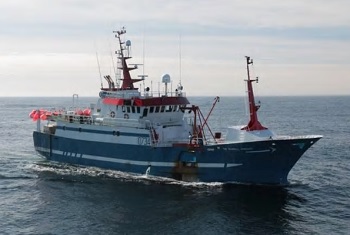
Clearwater pulls plug on storing lobster traps at sea
North America’s largest shellfish producer, Halifax-based Clearwater Seafoods, says it has stopped storing lobster traps at sea. Clearwater’s practice of leaving thousands of pots on the ocean floor for weeks at a time earned it a conviction for a “gross violation” of Canadian fishery rules. Unlike every other lobster fishery, there is no season and Clearwater has been awarded a quota of 720 tonnes, which it says represents about 15 percent of all lobster it sells. >click to read<12:58

OPINION: Fisheries Act changes bring Canada into the 21st century
Despite warnings in your Feb. 1 editorial that changes to the Fisheries Act were “pure madness,” the opposite in fact is true. For the most part, the upgrades are common sense, enable existing policy frameworks and bring Canada into the era of modern fisheries management. Bill C-68 tabled last week is the culmination of not just the past 18 months of consultation, but more than two decades of pressure to modernize the Fisheries Act. It is 150 years old this year – only the British North America Act is more ancient – and it’s high time that Canada updated the contents. >click to read< 09:58
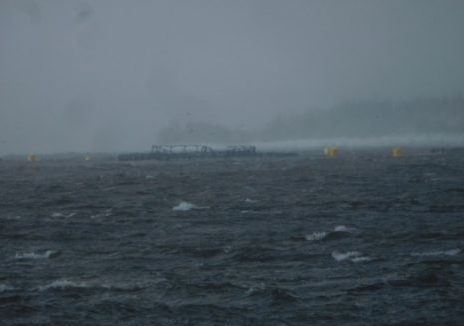
Nova Scotia: Storm damage to fish farm pens alarms Shelburne County fisherman
In addition to ice and snow, remnants of Nova Scotia’s first major winter storm are all over the shore of Jordan Bay, N.S. in the form of buoys and plastic pipes. The debris, which came from the Cooke Aquaculture fish farm, is concerning to commercial lobster fisherman Ricky Hallett. He suspects many of the fish died. “Seventeen out of 20 of the pens have the tops off them and most of them have the sides smashed down,” Hallett said. “I live just adjacent to the site and I can look right out on it.” click here to read the story 15:56
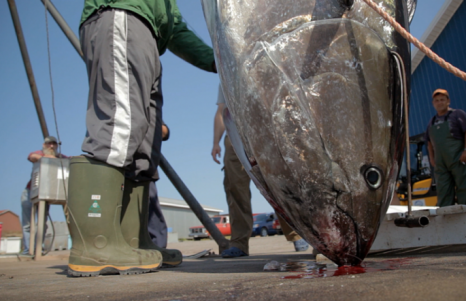
Bluefin tuna in P.E.I. are so hungry they no longer fear humans
Bobbing up and down on cold Atlantic waters, several fishermen toss scaly, silver mackerel overboard. It’s a delicious snack for a bluefin tuna — the largest species of tuna in the world, measuring more than six feet in length and weighing up to 1,600 pounds. The newcomer among them, a writer and ecologist, expects to spend the afternoon patiently waiting for a bite. Instead, the bluefin tuna here in North Lake, P.E.I. are so abundant and so hungry that within minutes their trademark yellow caudal finlets are circling the boat. click here to read the story 18:29
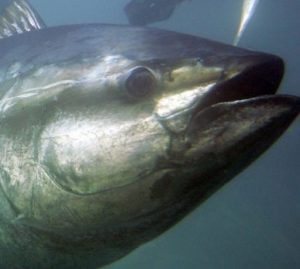
ICCAT Ups Canadian Share of Bluefin tuna quota
Fishermen in Atlantic Canada will be able to catch another 77 tonnes of Bluefin tuna next year after an international commission agreed to raise the annual quota following an improvement in stocks. The increase was approved Tuesday during a meeting in Marrakech, Morocco of the International Commission for the Conservation of Atlantic Tunas (ICCAT). Environmental group ‘disappointed’ Still, the increase was denounced by the Ecology Action Centre, click here to read the story 17:47
Transatlantic tuna may be boosting stocks in Gulf of St. Lawrence
 New science released by the international body that manages Atlantic bluefin tuna suggests a theory about why there have been so many tuna in the Gulf of St. Lawrence in recent years. Katie Schleit, senior marine campaign coordinator for the Ecology Action Centre, said science released by the International Commission for the Conservation of Tuna (ICCAT) found a large number of the tuna caught in Gulf waters are from the Mediterranean region. click here to read the story 16:33
New science released by the international body that manages Atlantic bluefin tuna suggests a theory about why there have been so many tuna in the Gulf of St. Lawrence in recent years. Katie Schleit, senior marine campaign coordinator for the Ecology Action Centre, said science released by the International Commission for the Conservation of Tuna (ICCAT) found a large number of the tuna caught in Gulf waters are from the Mediterranean region. click here to read the story 16:33

Nova Scotia lobster fishermen reject idea of surveillance cameras on boats
The global demand by consumers (enviro’s) that seafood be harvested sustainably made its way into a firehall in Lockeport Thursday. More than a hundred fishermen from southwest Nova Scotia showed up at an information session on the use of video cameras on fishing boats to monitor catch. The session was hosted by the Department of Fisheries and Oceans and organized by the Ecology Action Centre. A fisherman from British Columbia and a program manager from the Gulf of Maine Research Institute both spoke about the use of camera monitoring in those regions. At issue is the bycatch of endangered or threatened species. In Nova Scotia’s lobster fishery, the Atlantic cod and cusk are among fish stocks to watch as they get trapped along with the crustaceans. Many of the fishermen who attended the workshop were upset about the perceived need for cameras, and suspicious about an invasion of privacy. click here to read the story 08:10
Canada: Atlantic bluefin tuna not listed as an endangered species
 Atlantic bluefin tuna will not be listed on the endangered species list, a decision released Wednesday. The federal government’s final decision was published in the Canada Gazette saying it would not be listed under the Species at Risk Act (SARA). Fisheries and Oceans Canada rejected advice to list the species as endangered last summer, saying western Atlantic bluefin tuna stocks have been rebuilding since 2011, when the Committee on the Status of Endangered Wildlife in Canada (COSEWIC) said tuna should be listed as an endangered species under federal species-at-risk legislation. Included in the decision was the government’s rationale and the steps that will be taken to help in its recovery. If the species would have been listed on SARS, it would no longer have been allowed to be fished commercially. The in Halfax is calling on the government to take steps to work and conserve the species. (of course!) click here to read the story 08:21
Atlantic bluefin tuna will not be listed on the endangered species list, a decision released Wednesday. The federal government’s final decision was published in the Canada Gazette saying it would not be listed under the Species at Risk Act (SARA). Fisheries and Oceans Canada rejected advice to list the species as endangered last summer, saying western Atlantic bluefin tuna stocks have been rebuilding since 2011, when the Committee on the Status of Endangered Wildlife in Canada (COSEWIC) said tuna should be listed as an endangered species under federal species-at-risk legislation. Included in the decision was the government’s rationale and the steps that will be taken to help in its recovery. If the species would have been listed on SARS, it would no longer have been allowed to be fished commercially. The in Halfax is calling on the government to take steps to work and conserve the species. (of course!) click here to read the story 08:21
Canada’s Bluefin Tuna Management: Time to Get it Right
 Back in August, Fisheries and Oceans Canada (DFO) released its recommendations on whether or not to list several marine species as endangered or threatened under the Species At Risk Act (SARA)—one of which was Atlantic bluefin tuna. Listing under SARA means the species is protected under Canadian law, and it becomes illegal to kill, harm, harass, capture or take an individual and prohibits the possession or trade of products made from them. DFO’s recommendation on bluefin was to not list bluefin under the Act, mostly citing the socio-economic impacts that would result from closing the Atlantic Canadian bluefin fishery if listed. Regardless of whether the government lists the species on SARA or not, these bluefin need more attention as they are currently at just 55% of their already depleted 1970s levels. Read the story here 14:02
Back in August, Fisheries and Oceans Canada (DFO) released its recommendations on whether or not to list several marine species as endangered or threatened under the Species At Risk Act (SARA)—one of which was Atlantic bluefin tuna. Listing under SARA means the species is protected under Canadian law, and it becomes illegal to kill, harm, harass, capture or take an individual and prohibits the possession or trade of products made from them. DFO’s recommendation on bluefin was to not list bluefin under the Act, mostly citing the socio-economic impacts that would result from closing the Atlantic Canadian bluefin fishery if listed. Regardless of whether the government lists the species on SARA or not, these bluefin need more attention as they are currently at just 55% of their already depleted 1970s levels. Read the story here 14:02
Farmed Atlantic Salmon make Seafood Watch’s ‘avoid’ list
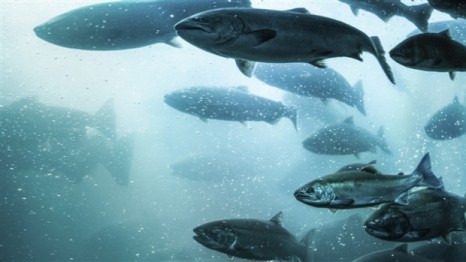 Environmentalists and an aquaculture company disagree about the findings of a new report from the United States that advises consumers to avoid some farm-raised Atlantic Salmon. “It’s not surprising, it’s clear that we need to have improvements in Canada. If we want to even be nearly equivalent to some of the better practices that are happening in Norway and Scotland,” said Susanna Fuller, a Marine Conservation Coordinator with the Ecology Action Centre. Read the rest here 16:34
Environmentalists and an aquaculture company disagree about the findings of a new report from the United States that advises consumers to avoid some farm-raised Atlantic Salmon. “It’s not surprising, it’s clear that we need to have improvements in Canada. If we want to even be nearly equivalent to some of the better practices that are happening in Norway and Scotland,” said Susanna Fuller, a Marine Conservation Coordinator with the Ecology Action Centre. Read the rest here 16:34
Ecology Action Centre: Harpooned swordfish more sustainable
 Nova Scotians can do their bit to protect the swordfish fishery by purchasing product caught only by harpoon, says the Ecology Action Centre’s marine policy and certification co-ordinator. “With a harpoon, the swordfish is targeted directly, and this is a sustainable model,” Catharine Grant said Tuesday. The alternative in the province is the longliner fishery, much of it centred on the Scotian Shelf.However, last week, the prestigious Monterey Bay Aquarium, through its Seafood Watch program, condemned this style of catching swordfish for its lack of sustainability. Read the rest here
Nova Scotians can do their bit to protect the swordfish fishery by purchasing product caught only by harpoon, says the Ecology Action Centre’s marine policy and certification co-ordinator. “With a harpoon, the swordfish is targeted directly, and this is a sustainable model,” Catharine Grant said Tuesday. The alternative in the province is the longliner fishery, much of it centred on the Scotian Shelf.However, last week, the prestigious Monterey Bay Aquarium, through its Seafood Watch program, condemned this style of catching swordfish for its lack of sustainability. Read the rest here
The Canadian government recently approved, without fanfare, the world’s first genetically modified fish to be produced in PEI.
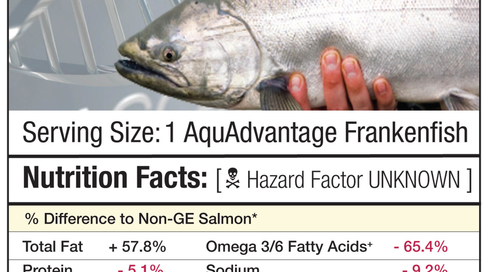 Canada quietly made history last November when officials at Environment Canada gave the go-ahead on production of the world’s first genetically modified food fish: the AquAdvantage® salmon. Read more here 06:56
Canada quietly made history last November when officials at Environment Canada gave the go-ahead on production of the world’s first genetically modified food fish: the AquAdvantage® salmon. Read more here 06:56
Canada approval of Aquabounty egg production challenged in court
![]() In their suit, the groups Ecology Action Centre, Living Oceans and Ecojustice claim the federal department did not follow its own legislated rules, failing to do a full risk assessment before clearing a US company to produce the eggs in Prince Edward Island. The court challenge demands the release of documentation on how the Harper government made its regulatory decision and the data and studies it was based upon. Read more@undercurrent 17:28
In their suit, the groups Ecology Action Centre, Living Oceans and Ecojustice claim the federal department did not follow its own legislated rules, failing to do a full risk assessment before clearing a US company to produce the eggs in Prince Edward Island. The court challenge demands the release of documentation on how the Harper government made its regulatory decision and the data and studies it was based upon. Read more@undercurrent 17:28

































